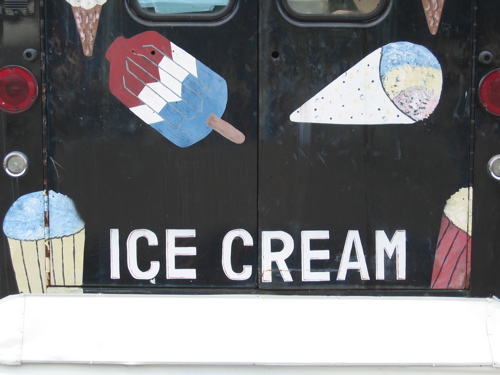July 21, 2006
RECORD STORES, PART 10

This is the last installment—and a good one—before I drop part 0: a long and boring account of my experiences in, and with, record stores.
Dave T-T-T-Tompkins: "I worked at the Record Exchange in Raleigh, NC.* I was hired for rap and made tapes for kids who were into Cannibal Corpse. They wore pink Baskin Robbins shirts streaked with chocolate. Entrails and ice cream. I forced Freestyle Fellowship on anyone who’d stick around long enough for a dub. I didn’t have time to be a dick really because I was too busy getting educated on all kinds of nonrap shit by people half my age, records I missed out on while listening to way too much New Jack Swing. Anyway, these kids—“these kids!”—were the only ones buying vinyl, of which we had little. Schoolly D always boosted store morale.
There was a two way interrogation mirror, behind which we did the mid-day cash count. One time I dozed off, drooling, with a wad of twenties in my hand. From that day on, I was introduced to customers as Hip Hop Dave Who Passed Out With A Stack of Twenties In His Hand HaHaHa.
I now mainly buy and trade vinyl. Digitally, I mainly count on the kindness of burns and downloads. My roommate works at The Sound Library, a Manhattan store which once had an asshole reputation, despite him being the nicest record store I guy I’ve met. Incredibly patient with every insane query. And I’m not just saying that because he leaves me alone with his records while at work. The store is closing soon anyway.
*the guy from Zimbabwe Legit worked at the store in Blacksburg, Va."
Eric Harvey : "In Indianapolis in the mid-to-late (pre-p2p, pre-eBay) Nineties, there was a boom—and I mean a boom—in second-hand CD stores. Anyone with a willing to pay strip-mall rent could make a minor living by selling gently used copies of 'Songs of Faith and Devotion' and 'Shakedown Street' and sometimes drug paraphenalia, and those looking for twenty bucks for the weekend could finally part with Terence Trent D’Arby’s second album and whatever else was gathering dust on the shelf. This boom only lasted for a year or so; between the point when CDs turned 10 and their initial novelty had long disappeared, and the time very soon after when people figured out how to extract the digital files from the discs and distribute them for free. The selection at these stores was predictably scattershot, but you could occasionally find a gem among the detritus. Among seemingly endless copies of 'Candlebox' and 'Emotional Rescue,' I managed to obtain, during the glorious summer of 1998, all but two of XTC’s major releases, 'Freak Out!' and 'Red Clay,' both of which I was amazed to find: I couldn’t grasp why anyone who came into contact with either would sell them back, but I was glad they did. The best thing of all about the used CD stores, though, was the fact that the clerks knew better than to try and pull rank on me.
There was what I called the 'walk of shame' with the snotty clerks at Luna Music or Missing Link, when he/she (there were plenty of shes), came from behind the counter with a pronounced sigh and, with all due exhaustion, walked me toward the section of the store I would have known if I knew anything in the first place. The fact that these people had not only the precious information I needed but the physical artifact to boot seemed to elevate them several thousand leagues above me in whatever hierarchy existed there, and they knew it. Or maybe I knew it. Regardless, and this was even worse, when I was checking out, a clerk would often motion to another idle clerk by holding up a CD I was buying. Whether it indicated silent affirmation or derision I never knew, because the other clerk would always seem to raise an aloof eyebrow before returning to his or her copy of 'Maximum Rock and Roll.' Whatever interpersonal dialogue was going on between these clerks was isolating and weird, and I didn’t like it one bit. But nothing of the sort happened at the used CD stores, because the odds were they didn’t have it. The clerks were fully aware that their stores relied on financial desperation or cultural ignorance or weekend feng-shui binges to stay in operation, and thus they usually stayed seated behind the counter with a to-go cup from the sub shop next door and whatever CDs they brought from home playing over the PA system."
Posted by Sasha at July 21, 2006 10:14 PM | TrackBack